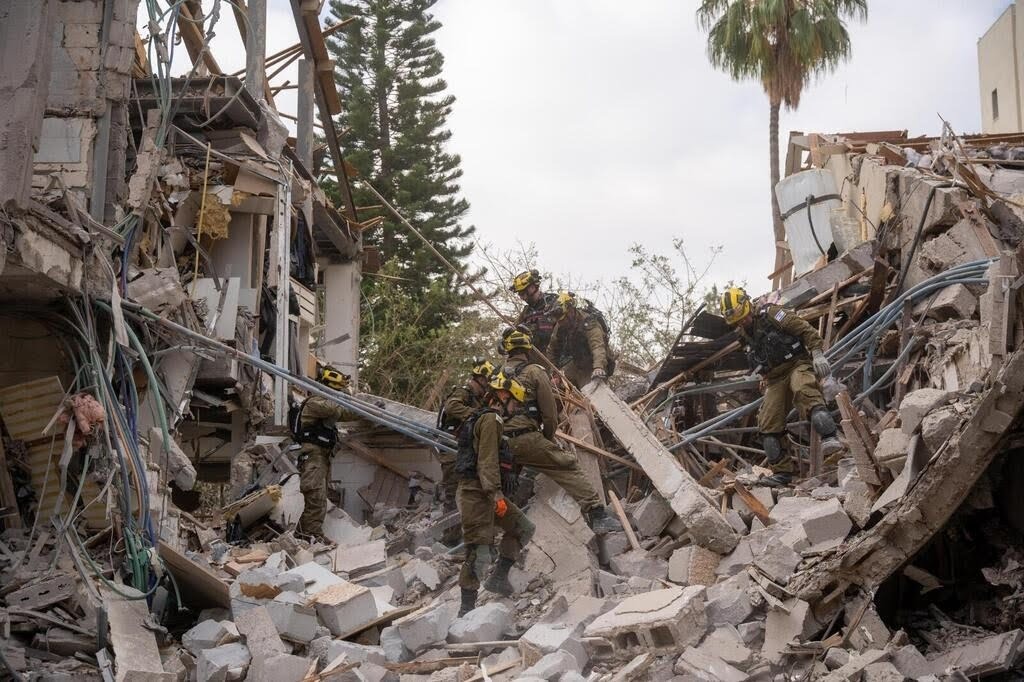The Israeli government is considering a new approach to rehabilitate neighborhoods ravaged by Iranian missiles, a win-win initiative that could not only provide swift compensation to displaced families but also earn significant financial returns for the state, Ynet reported.
According to a proposal submitted by the Israel Builders Association to the inter-ministerial task force for rehabilitating missile impact zones, homeowners whose apartments were destroyed would receive immediate and full compensation, enabling them to purchase a new apartment elsewhere.
In exchange, the state would inherit developmental rights to the original sites of the apartments, redesign the neighborhoods, and sell the land to developers via competitive bid, likely at a hefty profit.
As families whose homes were reduced to rubble continue to live in hotels, the path forward remains unclear. Efforts to advance urban renewal projects on the destroyed blocks are underway, but the Justice Ministry has expressed concerns over the legality of infringing on property rights by imposing urban renewal projects.
In a letter addressed to the inter-ministerial team—made up of representatives from the Finance, Housing, Interior, and Justice ministries—Builders Association Vice President Tomer Tzali’ach presented a practical, fast, and cost-effective strategic plan.
For urban renewal projects already in progress, the association proposes giving homeowners a choice: either accept a cash payout and relocate or stay in the development under improved terms. To make staying more appealing, developers would be required to offer more generous compensation. If a resident chooses to opt out, the state would take over their property rights and assume their position in the project.
However, rebuilding involves more than just financial compensation. Property rights must be addressed directly. Under current law, homeowners whose properties are destroyed can receive either monetary compensation equivalent to their apartment’s value or a rebuilt unit with modern upgrades such as secure safe rooms and elevators. Still, this provides limited motivation for homeowners to support urban renewal efforts—especially when such projects might add new units to existing buildings or even replace them with high-rise towers. Many residents oppose what they perceive as unnecessary disruption to their neighborhoods.
To address these challenges, the Builders Association recommends expanding building rights for existing units and ensuring that urban renewal projects do not compromise current property entitlements. In situations where a project lacks majority support—or where residents’ opposition could block progress—the association suggests granting the state authority to expropriate ownership rights. In such cases, homeowners would receive fair compensation based on the projected value of a newly built apartment with enhanced rights.
Once the state acquires these rights, it could expedite the creation of a new master plan for the area, optimizing both density and development potential. Permits could then be issued without delay. The subsequent sale of the land to developers would allow the state to recover—and likely exceed—its initial investment.
In projects where a majority of residents are already in favor, the state would only need to expropriate the units of remaining holdouts—who would still receive compensation—clearing the way for developers to move forward. To further support displaced residents, the state could offer government-backed mortgages to help them purchase new homes.
“Our proposed model gives homeowners maximum flexibility,” Tzali’ach wrote. “They can rent, purchase a replacement apartment, or wait for new construction in their original neighborhood. We believe this not only protects property rights but also offers a swift, dignified solution that opens the door for widespread renewal.”
A crucial component of the plan is dramatically reducing the time it takes to secure planning and construction permits—currently, a process that can drag on for years. “That timeline is simply unacceptable, especially when entire buildings have been reduced to rubble,” Tzali’ach noted. “To rebuild quickly, we need new tools—streamlined, efficient, and practical—that can shrink the planning window to just a few short months.”
YWN Israel Desk—Jerusalem)











